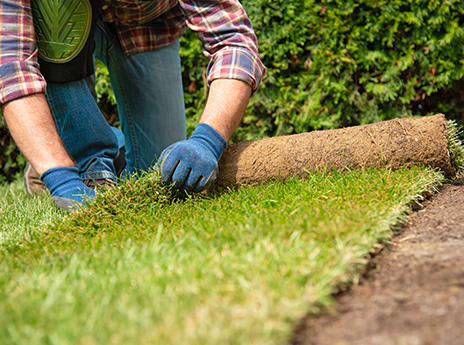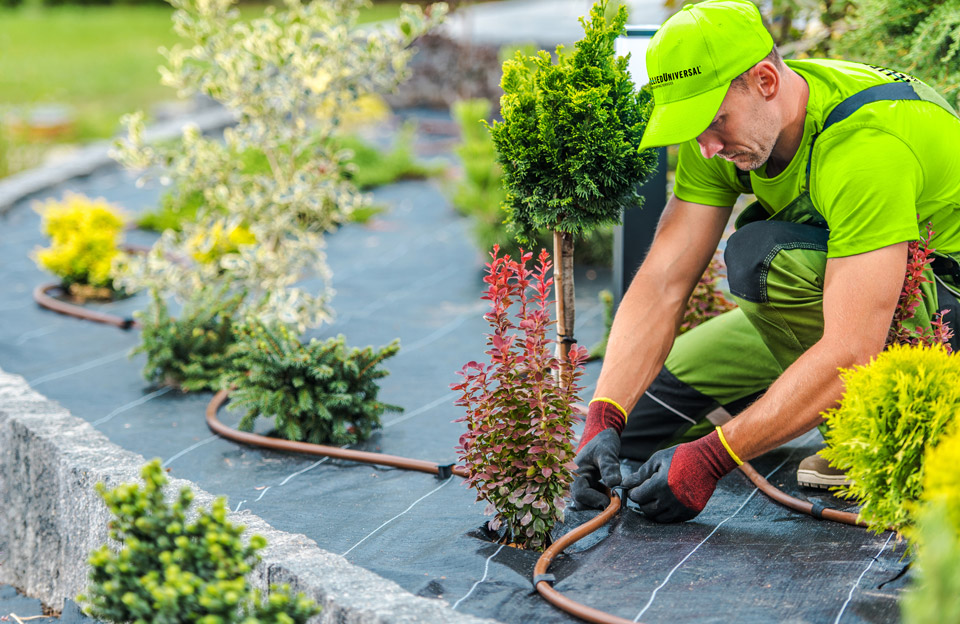Comprehending the Comprehensive Scope of Works in Specialist Landscaping Services
The comprehensive scope of expert landscape design services encompasses a range of fundamental elements - landscaping. It consists of landscape style principles, plant selection, and hardscaping functions. Additionally, it resolves irrigation systems and maintenance methods. Each element plays a vital function in developing practical and visually pleasing exterior areas. Comprehending how these components work together can reveal much regarding the art and scientific research of landscape design. The journey right into this elaborate field is simply beginning.
Landscape Design Concepts
Efficient landscape layout principles are important for producing unified exterior areas that enhance both aesthetic allure and capability (Learn More). These concepts guide the plan of aspects within the landscape, ensuring a natural aesthetic experience. Secret elements consist of equilibrium, which disperses visual weight uniformly; proportion, which associates the size of various aspects to each other and the space; and unity, which develops a sense of wholeness through regular themes and materials

Plant Selection and Installation
In the domain of expert landscaping, plant selection and installation play a critical function in achieving a thriving garden. Emphasizing native plant benefits, seasonal considerations, and the certain soil and sunshine needs of each species assures a lasting and cosmetically pleasing landscape. Cautious planning in these locations not only enhances biodiversity however likewise promotes long-lasting eco-friendly wellness.
Indigenous Plant Advantages
Why should house owners consider native plants for their landscaping projects? Native plants use many benefits that boost both appearances and ecological sustainability. They are well-adapted to neighborhood environments, needing much less water and maintenance compared to non-native varieties. This strength reduces the need for chemical plant foods and chemicals, promoting a healthier ecosystem. Additionally, native plants supply habitat and food for regional wild animals, consisting of pollinators, which can boost biodiversity in houses. Their knowledge with local soil and weather likewise brings about much better development rates and long life. By picking indigenous plants, homeowners not only develop aesthetically appealing landscapes however additionally contribute to ecological conservation, making a favorable effect on their local environment. Subsequently, native plants represent a clever selection for landscaping projects.
Seasonal Plant Considerations
House owners who have accepted indigenous plants in their landscape design can additionally enhance their exterior areas by thinking about seasonal plant options. By integrating plants that flourish in particular periods, they can create dynamic and visually enticing landscapes throughout the year. Spring may introduce lively blooms like daffodils and tulips, while summer season can showcase rich vegetation and vibrant perennials. Fall presents a palette of cozy tones with asters and goldenrods, while wintertime can be highlighted with evergreens and ornamental grasses for structure. Professional landscapers usually recommend selecting plants that not just complement existing native species but likewise provide year-round passion and support regional wild animals. This thoughtful technique to seasonal plant selection guarantees a consistently advancing and lasting yard setting.
Soil and Sunlight Needs
Successful landscaping rests on comprehending the certain soil and sunlight needs of plants. Various types grow under differing conditions, needing a careful evaluation of both elements during the selection procedure. Soil kinds, such as sandy, clay, or loamy, impact water drainage, nutrient accessibility, and origin advancement. In addition, pH levels can affect plant health, requiring dirt screening to determine viability. Sunlight demands differ significantly; some plants prosper completely sun, while others favor complete or partial shade. A specialist landscaper takes into consideration these components to assure peak development and aesthetic charm. By lining up plant selections with the setting's specific features, landscapes can attain sustainability, durability, and visual harmony, ultimately leading to effective plant establishment and long-lasting upkeep.
Hardscaping Attributes and Construction

While landscape design frequently evokes images of lush greenery and lively flowers, hardscaping features play an important function in defining exterior rooms. These aspects, which consist of patio areas, pathways, maintaining walls, and ornamental stonework, provide framework and functionality to lawns and yards. Hardscaping uses products such as concrete, wood, stone, and block, permitting for varied designs that match the natural landscape.
The building of hardscaping features calls for mindful planning and execution to ensure toughness and aesthetic allure. Specialists assess website problems, drainage, and spatial connections to create cohesive outside environments. Proper setup methods are critical, as they prevent problems like disintegration and changing with time.
Integrating hardscaping not just improves the aesthetic rate of interest of a building but likewise facilitates outdoor activities, making it a basic facet of detailed landscaping services. Inevitably, thoughtful hardscaping adds to both the performance and elegance of outdoor spaces.
Irrigation Solutions and Water Administration
Reliable watering systems and water administration are vital elements of professional landscaping, as they guarantee that plants obtain the required hydration for ideal growth. These systems can vary from easy drip irrigation setups to innovative automated automatic sprinkler, developed to meet the details demands of varied landscapes. Correct water management not only optimizes water use, reducing waste, however also boosts plant wellness and decreases disease threats.
Landscaping specialists evaluate various aspects, including soil kind, plant types, and neighborhood environment, to develop customized irrigation services. In addition, integrating rain harvesting strategies can further enhance sustainability and efficiency. Routine upkeep of irrigation systems is vital to preserve capability and avoid leakages, which can result in water loss and enhanced costs (Learn More). Ultimately, a properly designed watering system plays a crucial duty in maintaining the aesthetic appeal of outside rooms while promoting eco-friendly stewardship within specialist landscaping techniques
Grass Treatment and Maintenance Methods
Lawn treatment and upkeep methods are basic for achieving a rich, healthy lawn that boosts the total landscape. These techniques include numerous techniques focused on advertising perfect development and aesthetic allure. Normal mowing is essential, as it urges thick, even development while stopping weeds from establishing. Additionally, appropriate fertilizing offers essential nutrients, with applications customized to the details grass kind and dirt conditions.
Watering methods should concentrate on deep, infrequent irrigation to encourage origin growth, while aeration improves dirt framework and advertises nutrient absorption. Pest and illness administration is also critical; recognizing issues early permits effective treatments that minimize damage.
Overseeding can invigorate broken or slim grass, enhancing thickness and shade (landscaping services). By implementing these targeted lawn treatment approaches, landscaping professionals can guarantee that backyards remain healthy and vibrant throughout the seasons, considerably adding to the general appeal of the residential property
Seasonal Landscape Care and Maintenance
As the periods change, correct landscape care comes to be essential for maintaining the health and wellness and charm of exterior rooms. Each period presents distinct obstacles and requirements. In spring, landscape experts focus on trimming, planting, and fertilizing to urge development. Summer season needs normal watering, weed control, and parasite administration to protect newly established plants.

Throughout the year, seasonal landscape upkeep assurances that outdoor areas continue to be aesthetically enticing and healthy. Professional services can give tailored maintenance plans that adjust to the particular needs of each period, allowing residential or commercial property proprietors to enjoy vivid landscapes year-round. Generally, seasonal treatment is a vital element of expert landscape design that promotes long life and aesthetic value.

Lasting Landscaping Practices
A growing variety of homeowner are welcoming sustainable landscaping techniques to develop ecologically pleasant exterior spaces. These practices concentrate on conserving resources, boosting biodiversity, and decreasing environmental impact. Indigenous plants are commonly chosen for their low water needs and compatibility with neighborhood communities, lowering the requirement for chemical fertilizers and chemicals. Rain gardens and permeable paving are used to take care of stormwater drainage, advertising groundwater recharge and decreasing erosion.
Sustainable landscaping incorporates natural horticulture strategies that prioritize soil wellness and advertise natural parasite control. Efficient watering systems, such as drip watering and rain harvesting, assistance enhance water usage. In addition, landscape designers significantly support for making use of recycled products, such as recovered wood and rocks, to decrease waste. By embracing these lasting methods, property proprietors not only contribute to eco-friendly preservation but additionally produce cosmetically pleasing settings that can love very little upkeep.
Regularly Asked Concerns
For how long Does a Landscaping Project Normally Require To Complete?
Generally, a landscape design project can take anywhere from a couple of days to a number of weeks to finish, depending upon the job's intricacy, size, and layout needs. Variables such as climate and resource availability also affect timelines.
What Aspects Influence the Expense of Landscape Design Services?
Various aspects influence landscaping service costs, consisting of job size, style intricacy, worldly quality, labor expenses, geographic place, and seasonal need. Each element contributes distinctively to the general economic requirements of a landscaping job.
Are Landscape Design Services Available Year-Round?
Landscaping services are generally offered year-round, although schedule might vary based on region, seasonal climate condition, and details service offerings. Some services might be restricted during extreme weather or off-peak seasons.
Do Landscaping Business Deal Warranties on Their Job?
Many landscaping firms do offer warranties on their work, which can vary in size and protection. Customers are urged to ask more info about specific terms, ensuring they comprehend what is guaranteed and any conditions that apply.
Can I Design My Landscape Without Professional Help?
Yes, individuals can design their landscapes without professional aid. Nevertheless, they may lack expertise in plant selection, format, and ecological factors to consider, possibly bring about much less effective designs that could call for pricey modifications later.
In the domain of expert landscaping, plant selection and installment play an essential duty in achieving a flourishing garden. Home owners who have accepted native plants in their landscape design can additionally enhance their exterior spaces by taking into consideration seasonal plant choices. Successful landscape design pivots on understanding the specific dirt and sunlight demands of plants. Efficient irrigation systems and water monitoring are important parts of expert landscape design, as they ensure that plants obtain the required hydration for excellent growth. Landscape design experts assess different variables, including dirt type, plant varieties, and regional environment, to develop tailored watering remedies.